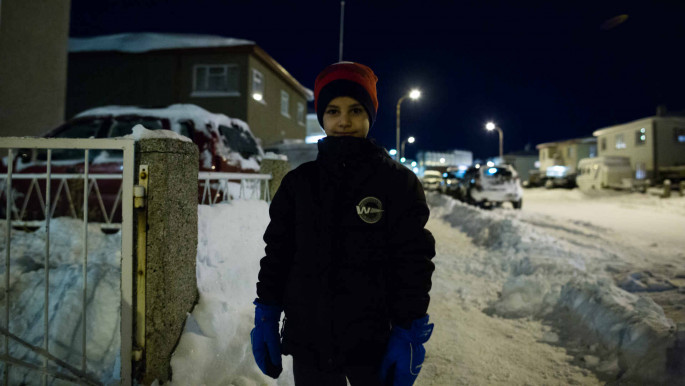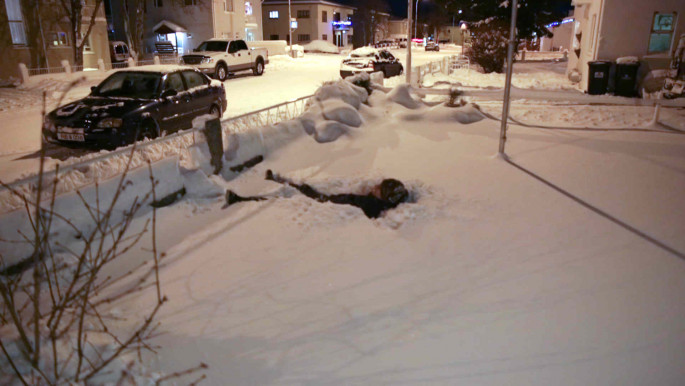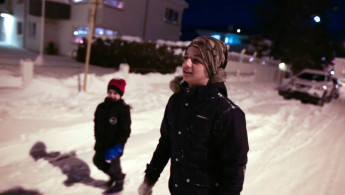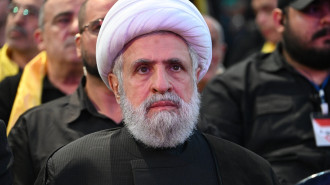Syrians find refuge at edge of Arctic Circle
"Imagine it. You go outside at 11 in the morning and it's still dark. Still night-time. And by 3pm, it's dark all over again. That's what it's like here," says Mousa al-Saadi.
Saadi, a calm man in his mid-thirties, came to Iceland in October 2016, when he, his wife and their six children were granted asylum as refugees.
The family now live in an apartment in greater Reykjavik.
In Iceland's winter, temperatures can reach as low as -25 degrees Celsius, with just three hours of sunlight. At the peak of summer, meanwhile, it never gets dark.
"We thought we'd be safe in Lebanon. We left the war in Syria to be safe - but that was far from the reality," he tells The New Arab. "We were harassed by Hizballah gangs there, and I was eventually beaten up and put in hospital, so UNHCR moved us to Iceland."
Although exact figures are thought to be much higher, at least one million Syrian refugees have fled to neighbouring Lebanon - a country with a previous total population below four million.
This has caused considerable tension, with reports of refugees facing exploitation and harassment at the hands of local people whose resources are under desperate strain.
"The people of Iceland are very kind. I expected there to be problems here like we experienced back in Lebanon, but that hasn't been the case," said Saadi. "My family and I have been able to relax here at last. Local families constantly help us if we need to know anything. If I need directions to the local supermarket, there's always someone to help.
"On Christmas day, Icelandic people sent my children loads of presents, which was very nice."
He and his wife, Manal, have four daughters and two sons, and all of eight live in a large, minimalist apartment in a Reykjavik suburb about 15 kilometres from the centre of town.
 |
Here the language is our main obstacle to fully integrating. This can be difficult at times but our situation is good here, so I'd never be ungrateful |  |
As a practising Muslim, Saadi visits his local mosque every week, a journey that takes him about 90 minutes travelling on three buses.
 |
|
| Jana and Valgerour al-Saadi received Christmas gifts from their Icelandic neighbours [Filippo Brachetti] |
"I take my children to mosque every week for Sunday school as well. I don't want them to lose touch with Islamic culture or forget how to speak Arabic."
Saadi's greatest challenge is learning Icelandic - although he concedes that his children are picking it up much faster than either he or his wife.
"Here the language is our main obstacle to fully integrating. This can be difficult at times but our situation is good here, so I'd never be ungrateful."
Since 1956, Iceland - a mountainous volcanic island about the size of Virginia home to around 330,000 people - has accepted fewer than 600 refugees. There are fewer than 150 Syrian refugees here. Many echo Saadi's difficulties with learning the Nordic language.
Wael Aliyadah, 36, is from Tartous in Syria and has lived in Reykjavik with his wife and three young daughters for more than 18 months. His 19-year-old wife, Ferayl, and daughters Jana, 5, and Julie, 4, speak fluent Icelandic - but he is still struggling.
"My daughters speak to each other in Icelandic now, and translate for me with neighbours or friends when I need them to," Aliyadah tells The New Arab. "And my wife learned when she worked at a local nursery - but I find it very difficult. Luckily, if you speak English, you don't need to speak Icelandic to find a job here."
Back in Syria, he sold fishing equipment at the harbour in Tartous. He hopes to do the same in Iceland, an economy traditionally dependent on the fishing industry.
His family flew to Iceland without legal permission, after they were forced to live on the streets of Greece for 14 months. Like Norway and Luxembourg, Iceland is in Europe's Schengen zone, which allowed them to travel to the island uninhibited.
 |
|
| Mousa al-Saadi and his wife have four sons and two daughters living with him in Iceland [Filippo Brachetti] |
The family applied for asylum in Iceland several months after they arrived, but were rejected the first time round.
The couple then managed to secure a spot on national television - and appealed directly to the Icelandic people before resubmitting an application.
More than 5,000 Icelanders petitioned for them to stay, eventually convincing the Icelandic government to grant them asylum.
"We're so grateful to the Icelandic people. They've been so kind - and even though I miss my family back in Syria sometimes, they've helped me to feel at home here very quickly," says Ferayl.
Since the start of 2016, 27 Syrians have been relocated to Iceland, some of whom have been given accommodation in Akureyri, a northern town less than 40 miles from the Arctic Circle.
 |
We don't like the weather and the fact it's often dark. We can feel isolated here... Compared to Lebanon though, where life was very difficult, we've won the lottery. |  |
Joumaa Naser, his wife and five sons, are originally from Damascus in Syria but now live in Akureyri. Fearing for their lives, the family fled Syria for Lebanon. However, the family were still unsafe there, so UNHCR relocated them to Iceland.
"What we like about being here is that we are safe. But we don't like the weather and the fact it's often dark. We can feel isolated here," says Naser. "Compared to Lebanon though, where life was very difficult, we've won the lottery."
 |
|
| Amjad, 12, loves the snow - but misses the sun [Filippo Brachetti] |
Still learning the language, Naser says that his only real friends in Akureyri are other Syrian refugees.
"At the very least, you need to be able to understand your friends if you want to talk to them," he says. "That's why, for now, the Syrian people here are my real friends. The Icelandic people have made us feel very welcome, though."
Despite the obstacles, his five sons are enjoying their new life. At school, they all have many Icelandic friends and are trying out new local sports.
Amjad is very positive about living in Iceland. Just recently, the 12-year-old tried skiing for the first time and really enjoyed it.
"I have lots of friends here," he tells The New Arab. "In fact, I'm friends with all my classmates and everyone is very nice - and there's lots of cool things to do.
"All I miss is the sun."
Natasha Bowler is a journalist and documentary producer based in Brussels, Belgium.
Follow her on Twitter: @NatashaBowler





 Follow the Middle East's top stories in English at The New Arab on Google News
Follow the Middle East's top stories in English at The New Arab on Google News


